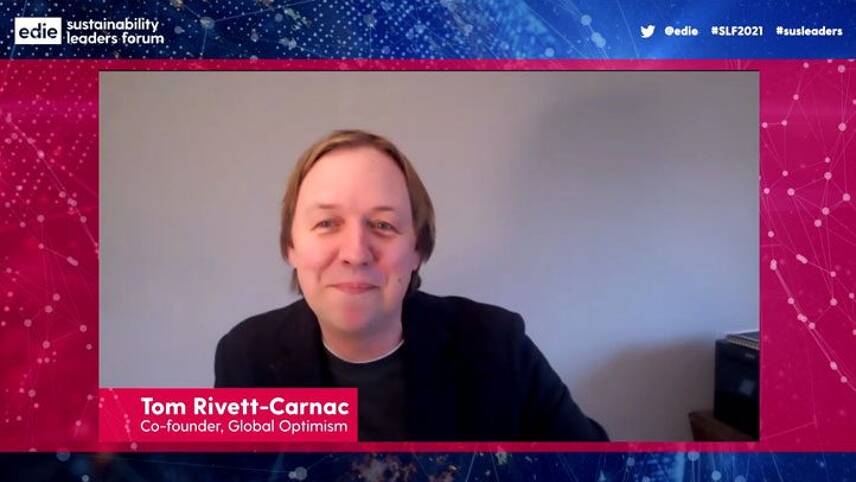Register for free and continue reading
Join our growing army of changemakers and get unlimited access to our premium content

Rivett-Carnac worked with the UN to develop the Paris Agreement before serving as president at CDP North America. Now
Rivett-Carnac is perhaps best known for his work co-founding Global Optimism with Christiana Figueres. The organisation’s mission is to inspire and support individuals, businesses and nations to play their part in combatting the climate crisis to “build a more equal, resilient, thriving future”.
This mission shone through in Rivett-Carnac’s keynote speech at Day One of edie’s virtual Sustainability Leaders Forum (scroll down for details).
Rivett-Carnac began by highlighting the fact that the Covid-19 pandemic did not “cost us our moment” to accelerate climate mitigation and adaptation, as many in the green economy feared when the World Health Organisation (WHO) first declared a global pandemic last March. Instead, against a backdrop of physical risks crystallising in the form of wildfires in Australia, California and even the Arctic Circle; a fresh appreciation for science-based approaches and the realisation that prevention can be better than cure, the net-zero and green recovery movements have snowballed.
He said: “It’s interesting to look back a year later; look at the way net-zero has broken into the global consciousness. By some estimates, the number of business, cities, regions and investors that are committed to net-zero targets has doubled or tripled.
“In terms of the temperature trajectory, if you look back a year, it was nearly 4C by the end of the century. If you now incorporate what Biden says he will do in the US, we are down at 2.1C. That’s not to say we’ve solved the issue, but something remarkable has happened over the course of the last year amidst the Covid-19 pandemic.”
But, he warned, continued progress is not guaranteed without both accelerated and broadened action on the ground – particularly in high-emitting sectors like transport – and a major mindset change to “stubborn optimism”. The term is defined as “a determination to face the reality that is coming at us with courage”.
Rivett-Carnac explained that some misconceive stubborn optimism as a wish to only focus on the positives and to ignore the complexities. Instead, he described the mindset as one in which “you face the reality full-on”, “accept that genuine failure is possible” and “acknowledge that real success is also possible”.
He elaborated: “An instinctive reaction is to recoil a little internally… it’s really frightening. But I would argue that the only rational response is to ride out to meet it and say ‘this is an enormous privilege, to be alive right now, to have the chance to turn things around’. Far from feeling a sense of disempowerment or loss of control… we should face it with determination.”
Advice for sustainability professionals
Rivett-Carnac works with an array of groups, from school climate strikers and SMEs, to big businesses and national governments. Indeed, “stubborn optimism” was coined during the development of the Paris Agreement, to engage those who rubbished the idea that an international agreement of this kind could be ratified.
He was asked to get more specific and provide advice on how sustainability professionals can be “stubborn optimists” in their day jobs to leverage change.
Responding to this question from chair Solitaire Townsend, Futerra’s co-founder, Rivett-Carnac said: “Don’t underestimate the impact and influence you have… wherever you sit in the seniority chain, there is now a very meaningful push from leadership because they understand that this is a major concern.
“Build constituency and become, somehow, an activist as an employee. And bring others with you, because the degree of transformation that this can drive is really important.”
He explained how chief executives are becoming increasingly sensitive to this catalyst or domino effect, recognising renewed climate activism as a driver of employee satisfaction and innovation and well as a way to reduce environmental impacts. Recalling a discussion with BP boss Bernard Looney shortly after the energy major announced its net-zero target, he said: “He was stunned at the degree of impact that this had had on [employees]. He said the commitment had ‘electrified us’ – all of a sudden, there was purpose, direction and motivation to be part of a collective endeavour.”
Rivett-Carnac also argued that sustainability professionals must, now more than ever, work along the intersections of social and environmental issues rather than working in siloes. Getting a firm to embed purpose at its core and across all departments, he said, should cover “inequality, intersectionality and other important issues” rather than decarbonisation as a standalone.
There’s still time to join the conversation at edie’s Sustainability Leaders Forum
From Tuesday 2 to Thursday 4 February 2021, edie’s award-winning Sustainability Leaders Forum event is returning in a brand new virtual format. This year, we are delighted to bring you speakers including former Energy Minister Claire O’Neill and World Green Building Council CEO Christina Gamboa.
This event will allow you to be connected with peers via face-to-face via video chats; be inspired by high-level keynote talks from industry leaders; be involved in a series of interactive panel discussions and live audience polls; and be co-creative in our interactive workshops, whilst also meeting leading technical experts in our dedicated virtual exhibition zone. Rooms, expo booths, private chats, bespoke stages and backstage passes – it’s all possible.
For a full agenda and to register now, visit: https://event.edie.net/forum/
Sarah George


Please login or Register to leave a comment.